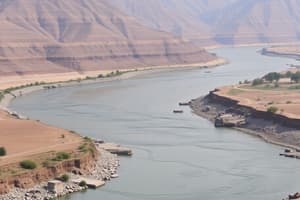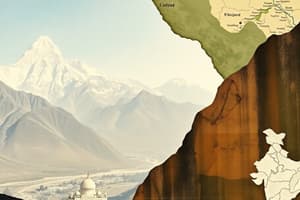Podcast
Questions and Answers
Which river converges with the Ganges at Allahabad?
Which river converges with the Ganges at Allahabad?
- Yamuna River (correct)
- Indus River
- Kosi River
- Brahmaputra River
Where does the Brahmaputra River enter India from?
Where does the Brahmaputra River enter India from?
- Nepal
- Tibet Autonomous Region of China (correct)
- Bangladesh
- Myanmar
Which river contributes to the grandeur of the Ganges River system and meets it south of Gorakhpur city?
Which river contributes to the grandeur of the Ganges River system and meets it south of Gorakhpur city?
- Brahmaputra River
- Kosi River (correct)
- Indus River
- Yamuna River
In terms of overall stretch, where does the Ganges stand compared to the Amazon and Nile?
In terms of overall stretch, where does the Ganges stand compared to the Amazon and Nile?
Which river is mentioned as one that shaped the landscape, culture, and civilization of the regions they pervade together with the Ganges River?
Which river is mentioned as one that shaped the landscape, culture, and civilization of the regions they pervade together with the Ganges River?
Which river is known for giving birth to the Harappan civilization?
Which river is known for giving birth to the Harappan civilization?
What is the approximate length of the Indus River?
What is the approximate length of the Indus River?
Which river is the holiest and most revered river in India?
Which river is the holiest and most revered river in India?
Which river originates from Tibetan glaciers?
Which river originates from Tibetan glaciers?
Which river joins the Jhelum River near Trimmu Barrage?
Which river joins the Jhelum River near Trimmu Barrage?
Study Notes
Rivers: A Journey Through India's Indus and Ganges Systems
Rivers carve landscapes, nourish ecosystems, support civilizations – all while constantly evolving across centuries. As we delve into two renowned rivers of South Asia, the Indus and the Ganges, let's also explore their tributary systems, gaining insights into their unmatched importance.
The Splendorous Indus River
The Indus River originates from Tibetan glaciers, flowing through Pakistan before entering India to eventually empty into the Arabian Sea. This river is significant because it gave birth to one of the earliest known urbanized societies, the Harappans. Some key aspects make this mighty waterway unique:
- Length: With a length of approximately 3,180 km, it ranks among the top ten longest rivers globally.
- Basin area: At roughly 90% within Pakistan and the rest shared by India and China, its basin area spans around 1 million square kilometers.
Notable tributaries of the Indus River system include:
- Jhelum River - Originating in Jammu & Kashmir, India, it contributes significantly to the irrigation requirements of Punjab province in Pakistan.
- Chenab River - Also commencing from Indian soil, it joins the Jhelum near Trimmu Barrage.
The Majestic Ganges River
The holiest and most revered river in India, the Ganges begins its journey high up in the western Himalayas, primarily from the snowmelt of Mount Gangotri. This sacred watercourse flows eastward, crossing over three countries—India, Bangladesh, and Nepal—before discharging into Bay of Bengal. Noteworthy characteristics associated with the Ganges include:
- Length: Stretching nearly 2,525 km, it stands third after the Amazon and Nile in terms of overall stretch.
- Basin Area: With almost 80% situated within India, its basin encompasses more than 812 thousand sq. km.
Likewise, several rivers contribute to the grandeur of the Ganges River system, such as the Yamuna, Brahmaputra, and Kosi.
- Yamuna River - One of the chief tributaries, it converges with the Ganges at Allahabad.
- Brahmaputra River - Originating in the Tibet Autonomous Region of China, it enters India, traversing Assam state before joining the Ganges near Dhubri district.
- Kosi River - Deriving from Nepalese territory, it meets the Ganges south of Gorakhpur city.
In conclusion, these iconic streams — the Indus and the Ganges — have profoundly shaped the landscape, culture, and civilization of the regions they pervade, birthing some of human history's most illustrious empires and serving as sources of life-sustaining resources even now.
Studying That Suits You
Use AI to generate personalized quizzes and flashcards to suit your learning preferences.
Description
Delve into the rich history and significance of the Indus and Ganges rivers in South Asia, exploring their tributary systems and the civilizations they have supported over centuries.




